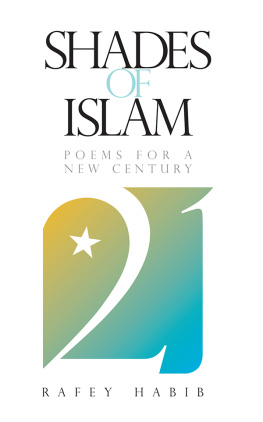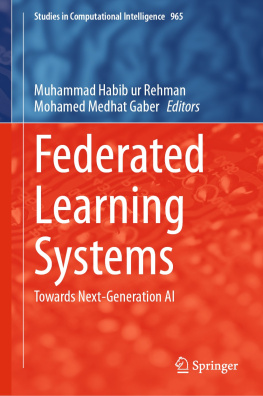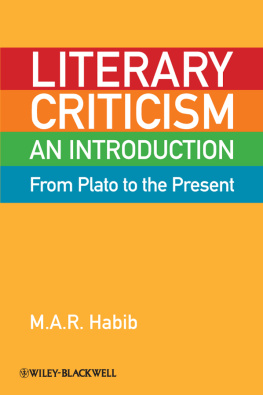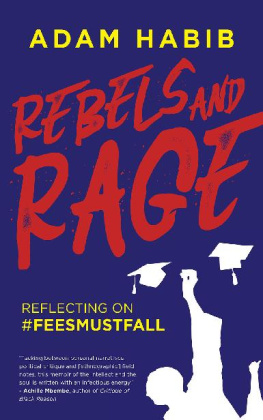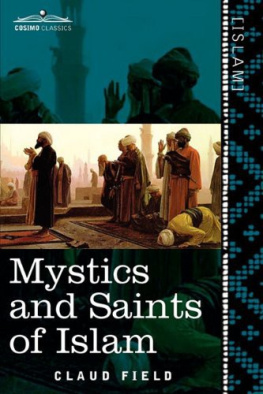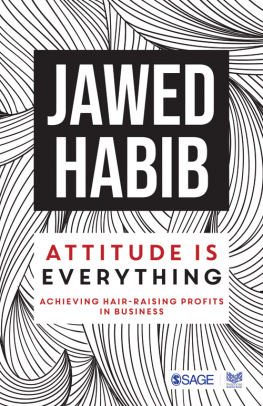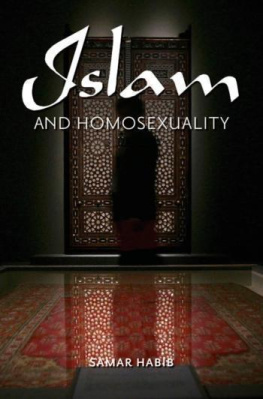SHADES
OF
ISLAM
SHADES
OF
ISLAM
POEMS FOR A
NEW CENTURY
RAFEY HABIB

First published in England by Kube Publishing Ltd,
Markfield Conference Centre
Ratby Lane, Markfield,
Leicestershire LE67 9SY
United Kingdom
Tel: +44 (0) 1530 249230
Fax: +44 (0) 1530 249656
Website: www.kubepublishing.com
Email:
Rafey Habib, 2010
All rights reserved
The right of Rafey Habib to be identified as the author of this work has been asserted by him in accordance with the Copyright, Designs and Patents Act, 1988.
A Cataloguing-in-Publication data record is available from the British Library.
ISBN 978-1-84774-021-2 paperback
eISBN 978-1-84774-099-1
Cover Design: Irfan Adrian Day
Typesetting: Nasir Cadir
D EDICATION
This book is dedicated to those Muslims, Jews and Christians who are striving to find a common path toward peace, mutual understanding and humanity.
C ONTENTS
I should like to thank the following people for their expertise in commenting on my manuscript: Joe Barbarese, Harold Shweizer, Carl Ernst, Renate Holub, John Carey, Terry Eagleton, Chris Fitter, Joe Meredith, Mughni Tabassum, John Farquhar and Tyler Hoffman. I should also like to thank Chris Barrett and Elizabeth Licorish for their kind help, as well as my former students Mary Ellen Bray, Sarah Skochko, Caitlin Marmion, Alicia DeMarco and Kevin Dickinson. I am grateful to Mr. Samuel Levin for his gracious comments. The cover was designed by Irfan Adrian Day, whose artistry once again shines above my words. I would like to thank Mr. Yahya Birt for his meticulous overseeing of this project. Finally, I am indebted, as always, to my wife Yasmeen, my sons Hishaam and Hasan, my mother Siddiqua Shabnam and the memory of my father, M.A. Khader Habib.
Rafey Habib
November 2009
From the still limited view of our century, the twentieth century was not a period convivial to religious verse and even less to expressions of religious devotion by non-Christians. There is little or nothing in canonical Modernism to suggest that writers like Hopkins, for instance, or even a Tagore had any lasting influence on the work of the century that followed. Minor precedents such as George Herbert were safely secured as expressions of Reformation Protestantism, and major figures like Dante and Milton were salted away in New Critical practice that taught us to read by separating form from content. Other than T.S. Eliot, whose religious views were the essential complements to his political and aesthetic ones, religious poetry written in English appears (if and when it does) as the expression of outmoded, quaint sensibilities. The regnant tonality of our poetry in fact is and continues to be irony.
The irony we find in these devotionals of Rafey Habib closer to the subtle tragedy of High Romantic poetry than the comic intellectual ironies of Modernism befits their occasions but also reveals the divided nature of the poet and poetry itself. On the one hand this is the record of an Islamic sensibility that proclaims itself on the opening pages:
God is the Light
Of the Heavens and of the Earth;
His Light is a parable, of
A Lamp within a niche; without the lamp, a glass
Haloed as a brilliant star, lit
From an olive tree
Light: A Passage from the Quran
In this dispensation, words are signs standing for other things, and those things are themselves evidence of the signature of creative intelligence on time and phenomena: Words, in this view, are
Symbols, stood in the still light;
Will not be understood
As words, signs for
Things
The evidence of the presence of God is the liber mundi itself, the world as a book autographed by an intending creator, intension standing behind each object the way meaning stands behind each word.
But the history of personal belief in a poets mind is always apocalyptic. It is continuously shaped and inevitably compromised by personal experience, whose messiness and resistance to closure is what makes it so seductive. A totalizing myth resolves contradiction and anneals our confidence in the rightness of our lives, but a poets experience includes suffering what is contradictory and coming to love the slipperiness of language itself. A poets arguments are directed not to abstractions but to the things of the world:
A woman washing her childrens clothes
By the rocks of a stream,
Eyes dark, unquestioning:
The mild reflection is her only truth.
Along the shore a young man walked,
Gazing at the nearness of sea and sky,
Dust in his image
Return (to India)
Habibs poems are thus the record of a sensibility at least thrice exiled or removed from origins. He writes as a Muslim in a Christian culture, as a native of Great Britain now living in the United States, and most alienated figure of all a poet who is trying to live the life of the spirit and the life of the mind at once. In poems like The World Does Not Hate America, he is uncompromising in his identifying himself and his family with twentieth century Modernism and with its explicit American expressions:
They dont hate us: thats a lie
Spewed by those who dare not travel
And a few who travel but dare not look.
Yet in poems like Muslim Love, whose intensity is its nostalgia, he is also deeply committed to mounting an argument for the Islamic faith whose painful contradictions these poems also recount:
You think Muslims
Are repressed, that
They berate love,
That they envy you!
Lets just say: they
Have great love:
If only you knew!
In poems such as Hymn, Recitation and Prayer, Habibs verses are religious in the Islamic tradition of figures such as Saadi and Rumi and the Western tradition of Herbert, Edward Taylor, and even, if carefully read, Shelley. These were writers who resisted the tendency of ideology to solve the world and its contradictions into a happy unity and instead sought in poetry a means of sensuously investigating those contradictions. It is as if poetry had aspired to the condition of prayer itself, or prayer had taken as its goal not an escape from human feeling but to supplement it, and not to deny belief but to represent it in terms of its varied material embodiments and see the unseen through the seen, the invisible in the visible, and whatever world there may be to come in this world.
J.T. Barbarese
November 2009

Glorious are You, in Your
Aloneness, Your
Pale eternal splendor
Beckons, in whose
Depthless light my shadow
Burns:
Hold me in Your moving stillness;
Let my night pass in
Your day.
Sublime are You, whose
Beauty burns in all Being,
Exalting all substance
Through the far corners;
Who breathed Your light
First on the face of formlessness, and last
On the forms of Human Reason.
Serene are You, in Your
Otherness, Your
Yearning depth embraces me;
Your knowing pales before itself:
Enthroned in realmlessness,
Your wisdoms endless sea
Is adrift in my tears.
Absolute are You:
The pavilions of Night wear Your perfect Form;
From East and West Your lanterns rise:
Light upon light.
World upon world are You, Knower
Of destiny, harbinger
Of Times still path;
Who finds me bowed
In the rhythms of fate;
Your splendor, it is in both worlds,
Your light, it fills the far corners of Being:

